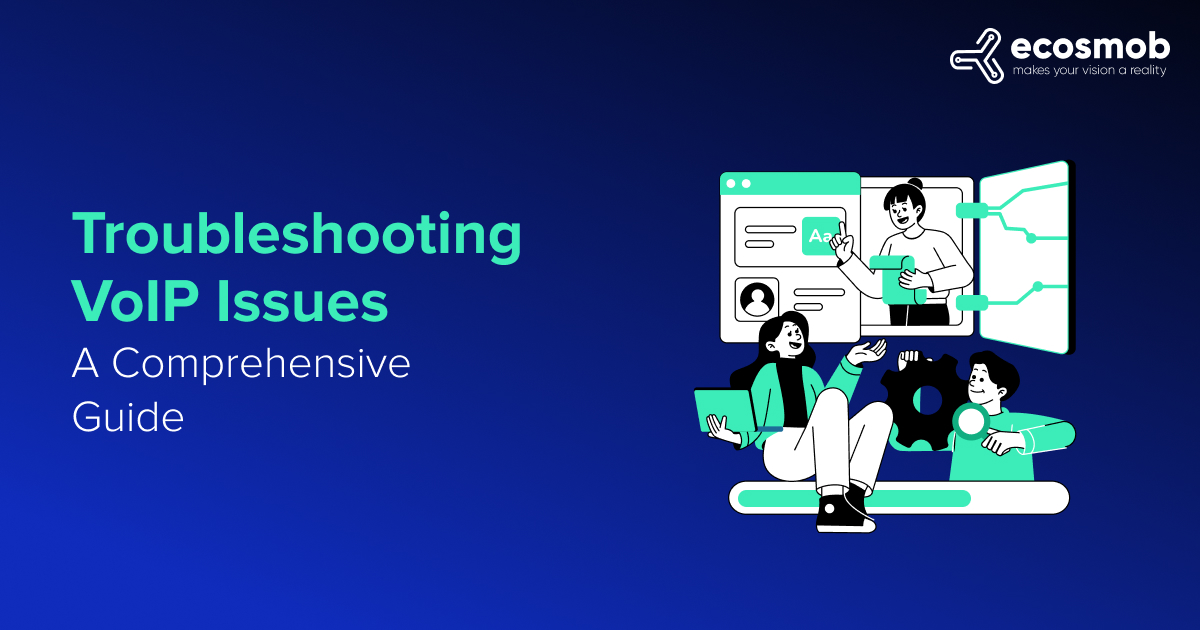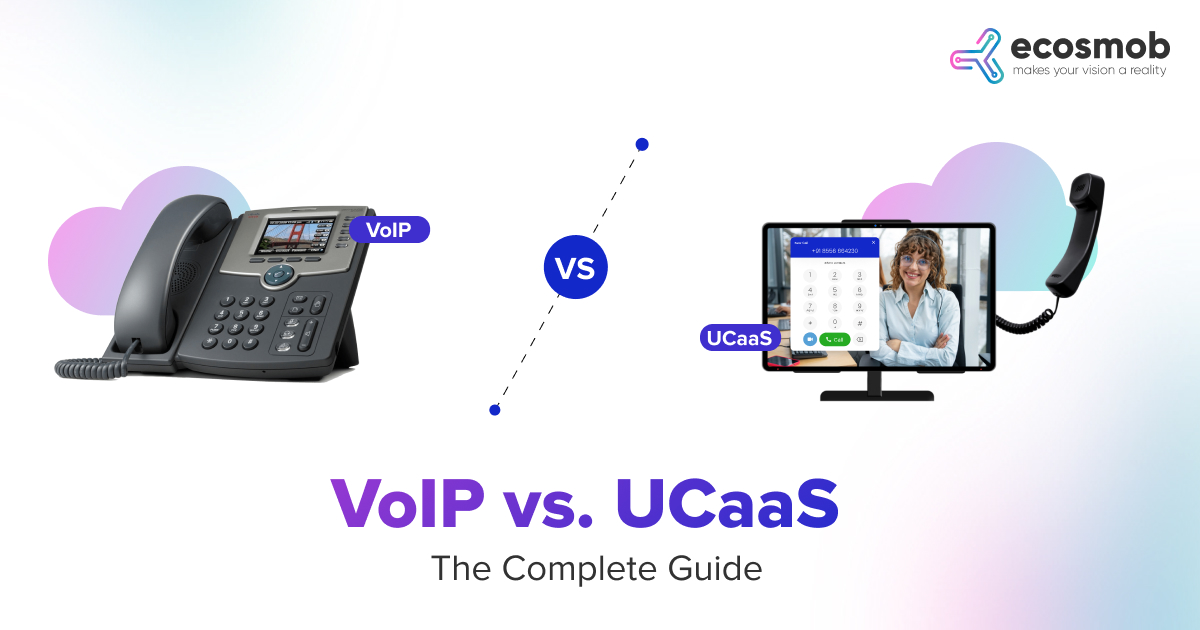The vast VoIP market offers various VoIP solutions that enable businesses to function. The Class 4 Softswitch solution is one of the most effective solutions in this range of numerous alternatives and is a vital element in the VoIP network. There are different types of VoIP Softswitches, in which the VoIP class 4 Softswitch is necessary to traverse the wholesale VoIP call traffic. A trustworthy class 4 Softswitch solution is thus required for any wholesale VoIP business, whether it already exists or is about to do so. The industry offers a wide range of possibilities for class 4 Softswitch systems, which makes choosing one extremely challenging. In this article, we’ll provide some tips that assist you in finding and buying the best class 4 Softswitch solution based on concurrent calls, which will help you grow your business in this digital era. But before that, let’s understand what concurrent calls are.
What are Concurrent Calls?
Concurrent Calls include the total number of calls, including active calls where two parties are communicating, calls in calling states, and calls in the queue or hold. The first emphasizes concurrent calls whenever a VoIP business owner considers buying an open-source class 4 Softswitch or another VoIP class 4 switch solution. Numerous concurrent calls frequently become crucial when contrasting two VoIP Softswitch or other solutions. Now, let’s talk about the factors that can affect concurrent calls.
Factors Affect Concurrent Calls
Along with different types of calls, some factors can affect the number of calls a switch can handle simultaneously.
Average Call Duration
Depending on your hardware configuration, calls that take longer to complete may result in fewer concurrent calls.
ASR or average success rate
Compared to VoIP Class 4 Softswitch development with lower ASR, those with greater ASR can manage more concurrent calls.
Hardware setup
A wholesale VoIP business can handle concurrent calls on a singer server. However, for that, the appropriate servers are required.
 Tips to Buy Best Class 4 SoftSwitch Solutions
Tips to Buy Best Class 4 SoftSwitch Solutions
Here are some key aspects to find and buy the best Class 4 SoftSwitch solution selected based on concurrent calls:
Check the feature list
The features of the various Class 4 SoftSwitches depend on the provider. Therefore, evaluating the characteristics offered by the Class 4 Softswitch solution you intend to purchase is crucial. The call routing rules, reporting, remote access to the solution from any location, and the integrated billing solution are some of the typical and essential features. You must ensure that the call routing rules contain all the rules you will need to manage your business successfully. For instance, essentially all VoIP Class 4 Softswitch systems include least cost routing (LCR), one of the most popular features, but lossless routing is a less frequent call routing rule, so if you need it, you have to hunt for it.
Capacity to handle concurrent calls
The number of simultaneous calls that a Class 4 switch can handle, as well as the overall call volume. It needs to be verified because it will determine how you may manage your wholesale call volume. It must be a high amount to support your business activities easily.
Check the scalability option
The scalability option needs to be verified because growth is something that many organizations strive for, and yours needs to be among the most forward-thinking. You will increase the volume of calls you manage in the coming days and months. Therefore, investing in a Softswitch solution will enable you to scale up quickly and efficiently is crucial. Additionally, it should accommodate a rising quantity of consumer accounts to call capacity. With the Class 4 solution, it is excellent to have unrestricted access now or in the future. The Class 4 Softswitch solution, which supports resellers and enables you to add more resellers to the program to facilitate operations, is required if you use the reseller model. Additionally, you can set up load balancing and failover in the system’s cluster.
Again, returning to the main discussion, let’s further discuss the features of Class 4 Softswitch selection based on concurrent calls.
Read our other blog on Difference Between Class 4 Softswitch and Class 5 Softswitch
Features of Class 4 Softswitch for Concurrent Calls
With a wide range of features, Class 4 Software Solution, a crucial part of the telecom core network, dramatically facilitates and streamlines the operation of wholesale VoIP service providers. The following list includes some of the essential characteristics of the Class 4 Software Switch solution:
 Responsive Call Routing
Responsive Call Routing
The VoIP Class 4 Softswitch software is the best option for controlling voice traffic and intelligently rerouting calls within the network. Class 4 Softswitch’s intelligent call routing capability helps lower latency, expenses, and overcrowding without sacrificing the quality of VoIP calls.
Fax Routing
VoIP Class 4 Softswitch allows service providers to enable fax routing per the users’ requirements.
Geographic, Non-geographic & Nomadic Routing
The Class 4 Softswitch solution allows geographic, non-geographic, and nomadic numbers inbound call routing.
LNP & MNP Routing
Class 4 Softswitch facilitates LNP (Local Number Portability) for MNP (Mobile Number Portability) and fixed lines for mobile phone lines routing, allowing users to manage routing based on the dialed number.
Routing for Class 5 and resellers
The solution supports routing for Class 5 and resellers. This platform enables service providers to build robust and scalable VoIP Softswitch solutions ranging from small single-server deployments to cluster solutions.
Failover and load-balancing support
Some of the crucial characteristics of VoIP Class 4 Softswitch software are load-balancing and failover support. These features allow service providers to provide a constant and uninterrupted connection, eliminating the chances of server breakdown or system slowdown. This software switch’s load-balancing capability enables it to manage an enormous burden without degrading service quality or causing a system crash. On the other hand, Class 4 Softswitch’s failover support feature guarantees that the backup system will keep the solution operating smoothly and without any interruptions in the event of a system failure.
Get customized VoIP SoftSwitch solutions for your business requirements. To know more
Numerous call routing regulations
The number of rate cards and business prospects is enhancing due to the wholesale VoIP service provider’s access to the payment costs through various call routing methods, including intelligent call routing, automated call routing, least call routing, percentage routing, and so on.
These are some of the essential features of Class 4 SoftSwitch. The VoIP Class 4 Softswitch solution is beneficial for users in numerous ways. Now, Let’s discuss the benefits of Class 4 switch selection based on concurrent calls.
Read our new blog on Why Class 4 Softswitch Makes VoIP Service More Attractive
Benefits of Class 4 Softswitch Selection Based on Concurrent Calls
Due to its distinguishing and compelling features, VoIP Class 4 Softswitch stands out among other VoIP software. These features spotlight as advantages over Class 4 switch selection based on concurrent calls:
 Simple to Set Up
Simple to Set Up
The Class 4 Softswitch solution is simple to set up and use. There are no first-hand hardware mess issues, such as collection wires or manual devices, because the switchboard is software integrated. Access is also convenient because it posts from any server or compatible device.
Scalable
The significant advantage of the Class 4 switch is that businesses can scale up quickly and efficiently to support their growing business requirements. Increasing client engagement and erasing regional barriers helps VoIP service providers grow their businesses. Its primary purpose is to make transition calls to other countries. As a result, the company scaled its service charges.
Reliable
The VoIP Class 4 Softswitch solution earns the user’s trust with a load balancing management and failover support mechanism. It organizes the log and effectively handles a load of calls and inputs from several servers. On the other hand, the failover system guarantees support from the backup plan in the event of an emergency or failure.
Remote access
VoIP Class 4 Softswitch can be accessible from any system, location, or convenient time thanks to a web-based access panel. It is accessible remotely from any location and does away with physical space restrictions.
Improved ROI
The Class 4 Softswitch solution lowers the additional costs for a more substantial ROI. Making administration more comfortable and convenient reduces costs while ensuring the system’s short-term smooth operation. Overall, it gives a more significant ROI and cuts down on the extra expenditures of maintaining the outdated manual method.
The benefits mentioned above of class 4 Softswitch solutions help boost your business and take it to the next level.
Wrapping Up!
One of the most crucial considerations when choosing a VoIP system, particularly for VoIP class 4 Softswitch, is frequently the number of concurrent calls. VoIP service providers can use Class 4 Softswitch, a reliable, scalable, and consistent software solution, to manage VoIP calls, signaling, and several other aspects of wholesale VoIP traffic. However, If you are looking for a Class 4 Softswitch solution to streamline your business process, ensure to choose us. We can deliver a robust VoIP Softswitch with custom features to meet your business’s precise needs and requirements.

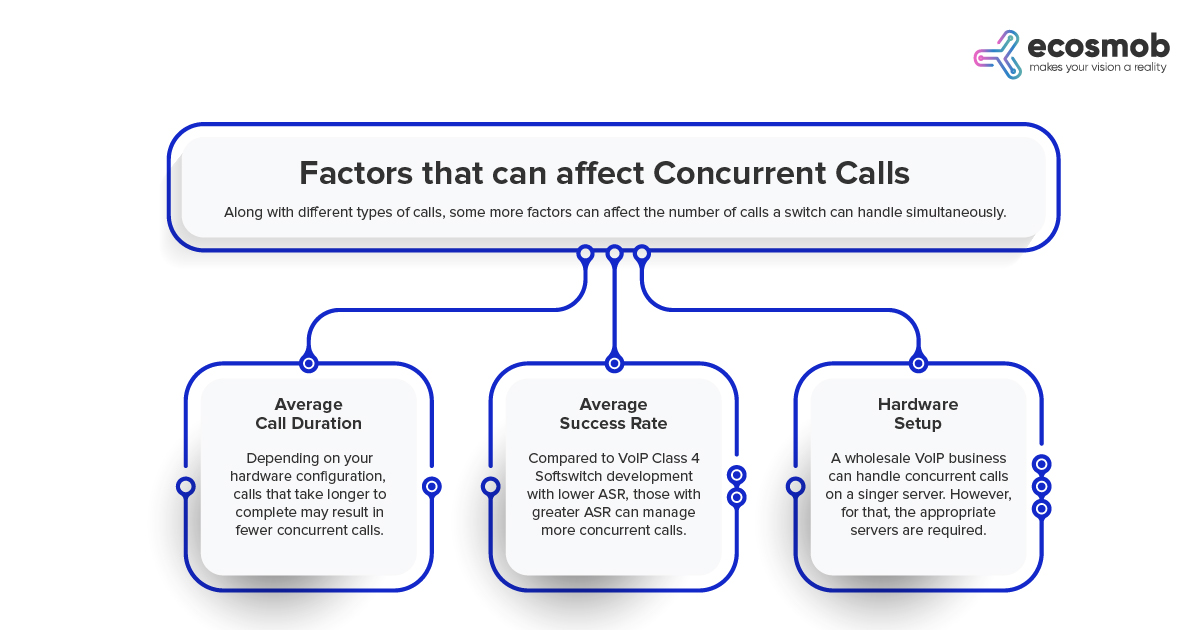 Tips to Buy Best Class 4 SoftSwitch Solutions
Tips to Buy Best Class 4 SoftSwitch Solutions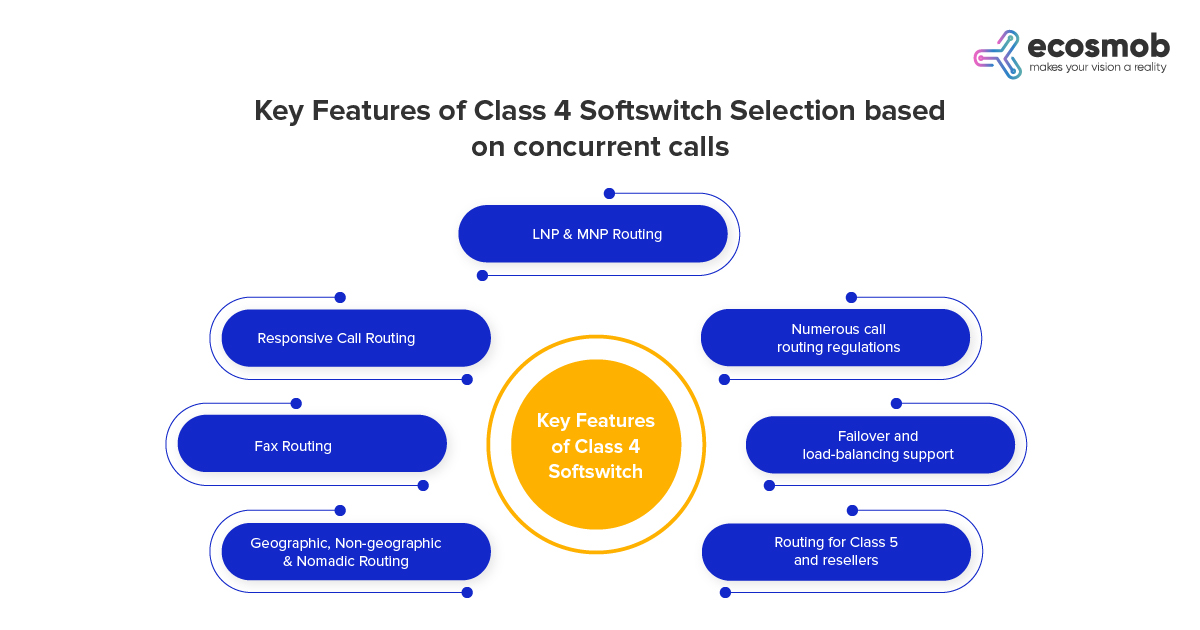 Responsive Call Routing
Responsive Call Routing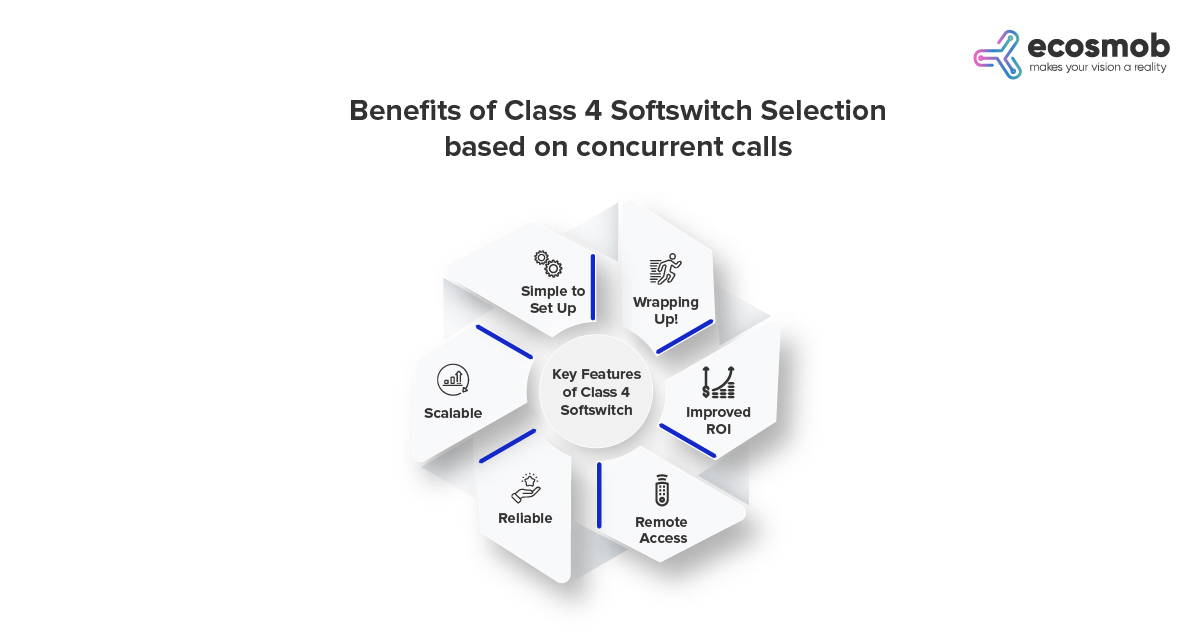 Simple to Set Up
Simple to Set Up